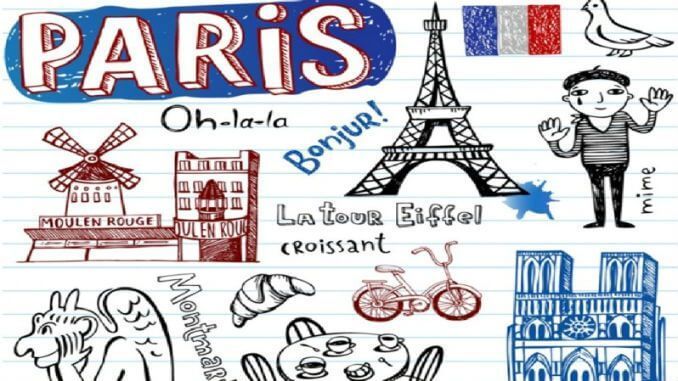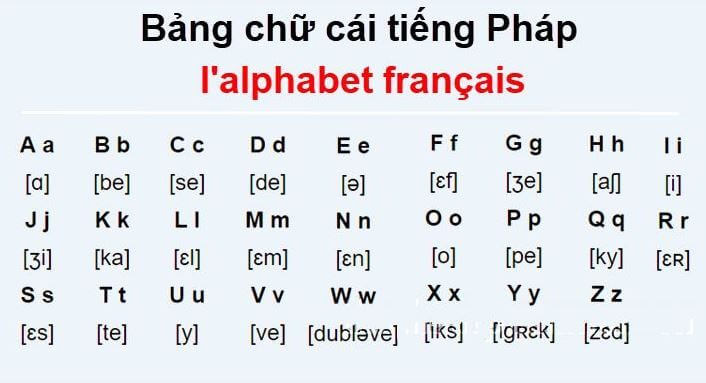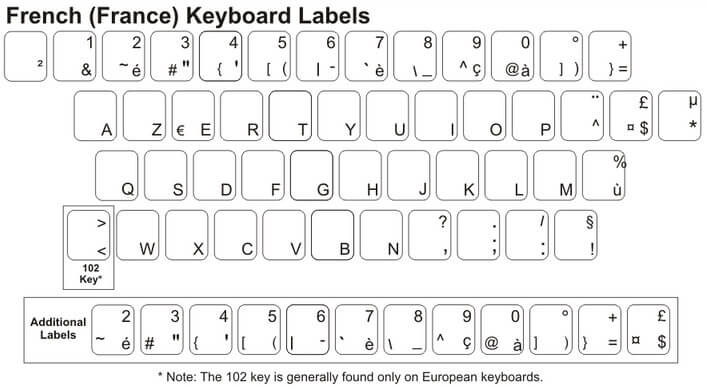French is the fifth most spoken language in the world, according to the latest edition of Ethnologue. The total number of speakers worldwide is 279.821.930. Fifty-five countries in the world speak French, with 29 of them using it as an official language, including Europe, sub-Saharan Africa, the Middle East, North America, Asia, and Oceania. .
French is one of the most studied languages worldwide. It is an erstwhile language of international diplomacy and negotiation and remains the language of scientific and literary standards. Likewise, it is also the language of fashion, food and ballet.
French is one of the working languages in a number of international organizations such as the United Nations (UN), the International Olympic Committee (IOC), the Red Cross, the European Union (EU), the Trade Organization and the European Union. World Trade Organization (WTO) and the North Atlantic Treaty Organization (NATO).

Several non-profit organizations, such as Amnesty International, Médecins du Monde and Médecins sans Frontières, use French as one of their working languages. Furthermore, French is a statutory language. It is one of the official languages in regional and international courts, such as the International Court of Justice, the European Court of Human Rights, the International Criminal Court, the International Court of the Law of the Sea, of the World Trade Organization and the Court of Justice of the European Union.
Note: Things You Need to Know When Studying Abroad in France
Some of the English words we use today are of French origin. Those words are in the English language without you noticing that these are non-English words. Some of them include:
déjà vu
a la mode
Cul-de-sac
RSVP (répondez s'il vous plaît)
chaise longue
creme brulee
of the day
coffee with milk
carte blanche
comme ci, comme
eau de toilette
fait accompli
fatal woman
film noir
foie gras
Grand Prix
hors d'oeuvre
joy of living
laissez-faire
threesome
objet d'art
purpose
vis-à-vis
avant-garde
misstep
high fashion
pirouette
prêt-à-porter
baguette
bourgeois
coffee
The number of French words included in the English dictionary confirms the influence of the French language on the English language. From 1066 to 1362 or about 300 years, the official language in England was French. The use of French continues to be widespread. This is all thanks to the active participation of cultural institutes such as the Alliance Française, which has 850 centers located in 137 countries from Europe to Asia.
Note: A Guide To Doing Business In France
Some Facts About French
The French language is not as ancient as Latin, but its development as a language began in the fifth century. French actually comes from Latin, like the Romance languages. Like other languages, the development of French has many stages and there are many interesting facts out there that show why French is such a fun and exciting language to learn and speak.
So we've determined that some French words are in the English dictionary and that about 45% of modern English words are of French origin. But did you know that modern French also has an English influence?

If you stay in France a little longer than the usual three days off a week, you may hear the French say words like:
une to-do liste
shopping
a parking
le hard discount
The mixture of French and English in modern French is called Franglais. The French purists didn't like it but they failed to stop the use of Franglais. In some cases, they have been successful, such as when the term "un pipeline" appeared in the 1960s.
Purists prevail when people use the correct term: “un oleoduc". However, they were unsuccessful with the word email. They want people to use"an email” but people insist on using email. However, official communications use French terminology.
Note: Top 05 French Translation Companies in Hanoi
Here are some great things you might not know about French. So add them to what you already know and impress your friends.
Popular classic novels and plays were originally written in French
We already mentioned that French is a language of literature. You may be familiar with Les Miserable. There are some more classic novels, such as Le Comte de Monte-Cristo, Madame Bovary, L'Étranger, Thérèse Raquin, Les Fleurs du mal, Bel-Ami, Tartuffe, La Cousine Bette, and La Gloire de mon père. However, some of the most famous children's fairy tales are written in French such as La Belle et la Béte (Beauty and the Beast), Le Petit Chaperon Rouge (Little Red Riding Hood), Le Chat Botté (The Cat Goes Hia). ), Cendrillon (Cinderella), La Barbe Bleue (Old Greenbeard) La Belle au Bois dormant (Sleeping Beauty).
French is not the original language in France
Before French became the official language of France, the country spoke Latin. It was only after the end of the French Revolution in 1799 that the French language was spoken by the locals. Incidentally, the French Academy (L'académie française), the council that regulates the use of the French language, was founded in the 1600s, much earlier than the French government in terms of the use of French as an official language. of the country.

The French language has many accents and dialects
French has many dialects or dialects that are spoken by locals in different regions. These dialects have pretty good accents. In some areas, the French dialects they use are not mutually intelligible. You can identify them in broad categories, such as northern dialects, southern dialects, and Standard French. Paris speaks expressively and quickly. Southern dialects have a softer accent than northern dialects.
Besides, there are French Canadians (including Québécois), Franco-Ontarian, Acadian-French that Canadians often speak. Influences from other languages make Belgian French, Franco-Swiss, Caribbean French, African French, Maghreb French and Indian French different.
Note: Quick Notarized Translation Quotation
There are no standard French words that begin with the letters K and W .
The letters K and W are in the French alphabet, but you cannot find these specific letters in standard French words. You can find them in regional and loanwords. When translating some English words into French, you would avoid using the letter W. For example, Warsaw is Varsovie in French while Wales becomes le pays de Galles. The letter K, on the other hand, is common in the prefix kilo, such as in kilometers, kilograms, kilohertz, and kilowatts.
The shortest and longest French
In the French dictionary you will find the longest French word, which is the word “anticonstitutionnellement” there are 25 letters. But this is not the longest word in French. The longest word, which is not in the dictionary, is the French term for "thiamine – aminomethylpyrimdinylhydroxyethylmmethythiazolium” there are 49 letters. Meanwhile, the shortest French word containing all the vowels is bird (bird).
A French town in the Marne Đépartement has the distinction of having the longest name: “Saint-Remy-en-Bouzemont-Saint-Genest-et-Isson”. But in the Somme, in the north of France, you'll find Y, which is actually the name of the town. In 2016, the population was 93. You can call people living in Y “Ypsiloniens"Or"Ypsiloniennes".
Irregularity on French Azerty Keyboard
The French language uses several diacritics to indicate the pronunciation of words. However, there is only one word in French that uses the sign ù – the word où, which translates into English as “where”. But it has its own key on the Azerty keyboard. The Azerty keyboard is commonly used by Flemish and French speakers in Europe.

Largest French-speaking cities outside of France
Some areas of the five continents of the world speak French. Outside of Paris, Kinshasa is the largest French-speaking city. It is the capital city of the Democratic Republic of the Congo. French is the official language in the country. In Kinshasa, 67% of the population can write and read French, while 68,5% can understand and speak French. Montreal and Brussels are behind Kinshasa in terms of the size of the French-speaking population.
Distinctive features of the French language
The French language has many distinctive features. It could be "faux ami” such as "le bras" or arms, and not women's underwear. A bookstore means “la librairie". "Actuel” means present while a nice horse means kindness.
Some French words have three consecutive E's, such as "agreee" (approved) and “créee" (was created). The only French word with a plural form that begins with another letter is oeil, which means 'eye'. Its plural is yeux. "Amour” is a masculine word in the singular form. But in the plural, amours, it becomes feminine.
Note: Professional Consular Legalization Service
What You Need to Know More When Visiting France
Did you know that ballet is a performance dance that originated in the Italian Renaissance? It later became a concert dance in Russia and France. Since it was formalized in France under King Louis XIV in the late 1670s, a large part of ballet terminology has been in French. The king founded the Académie Royale de Danse to develop the standards and certifications of dance instructors. As the popularity of ballet waned in France, its growth continued in Russia, Italy, and Denmark.
Here are some The most amazing facts about the French language that you may not know. We hope that these facts will enrich your knowledge of French and make you appreciate French culture even more.
When you set foot in France, you will need a professional translation or interpretation service to help you get the best experience here. Idichthuat – The leading professional translation company in Vietnam today will meet all your needs and help you get a service experience French translation the best.
Contact us today for the fastest service quote and consultation.
| ✔️ See more related information: | 👉 Reliable, Cheap, Professional Swedish Translation Chuyên |
| 👉 The Most Professional Electronic Translation | |
| 👉 Quick Translation of Seafood Documents | |

Nguyen Trung Khang - Talented interpreter and translator, passionate about translation
Nguyen Trung Khang is a talented interpreter and translator, with many years of experience in the field of translation and linguistics. He graduated from Ho Chi Minh City University of Education, majoring in Linguistics in 2015.
After graduating, Mr. Khang participated in a professional interpretation and interpretation training course at the University of Foreign Languages - Hanoi National University. He achieved a high-level certificate in interpreting and interpreting, and was also awarded a master's degree in linguistics.